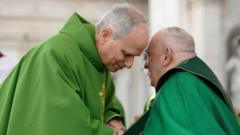Robert Francis Prevost, now Pope Leo XIV, aims to reshape the power dynamics within the global Catholic Church.
Pope Leo XIV: The First American Pontiff Reshapes Catholicism

Pope Leo XIV: The First American Pontiff Reshapes Catholicism
The election of a U.S. pope brings new perspectives to the Vatican.
Robert Francis Prevost made history on May 8, 2025, when he was elected as the 267th pope of the Roman Catholic Church, adopting the name Pope Leo XIV. His election marks a significant milestone, as he becomes the first-ever pope from the United States. This decision by the assembly of 133 cardinals comes after two days of secret voting within the hallowed confines of the Sistine Chapel, challenging the longstanding notion that a pope from a global superpower was unlikely.
At 69 years old and a native of Chicago, Prevost's international experience could redefine the role of the papacy. His prior work in Peru, where he served as a bishop and embraced naturalization, demonstrates his commitment to a global Catholic community. His influential role in managing bishops worldwide under Pope Francis further solidifies his qualifications for the position, appealing directly to the powerful Roman Curia eager for stability after years of reforms.
As Pope Leo XIV, Prevost's approach is expected to contrast sharply with the rising tide of conservative Catholicism in the U.S. and the radicalized Christian influence that emerged during President Trump's tenure. Observers speculate that he may emphasize inclusivity and interfaith dialogues—key components in his pastoral mission.
The implications of his election extend beyond church governance; Prevost has the potential to bridge divides and revitalize the church's mission on social justice and unity. As the world watches closely, Pope Leo XIV may signify a transformative chapter in the history of the Catholic Church.
At 69 years old and a native of Chicago, Prevost's international experience could redefine the role of the papacy. His prior work in Peru, where he served as a bishop and embraced naturalization, demonstrates his commitment to a global Catholic community. His influential role in managing bishops worldwide under Pope Francis further solidifies his qualifications for the position, appealing directly to the powerful Roman Curia eager for stability after years of reforms.
As Pope Leo XIV, Prevost's approach is expected to contrast sharply with the rising tide of conservative Catholicism in the U.S. and the radicalized Christian influence that emerged during President Trump's tenure. Observers speculate that he may emphasize inclusivity and interfaith dialogues—key components in his pastoral mission.
The implications of his election extend beyond church governance; Prevost has the potential to bridge divides and revitalize the church's mission on social justice and unity. As the world watches closely, Pope Leo XIV may signify a transformative chapter in the history of the Catholic Church.




















